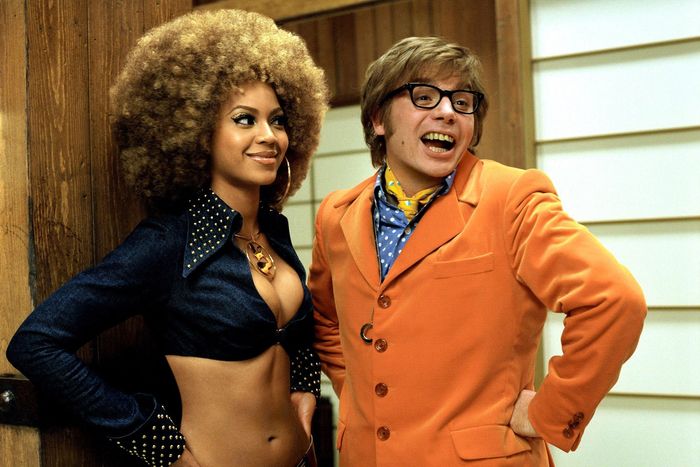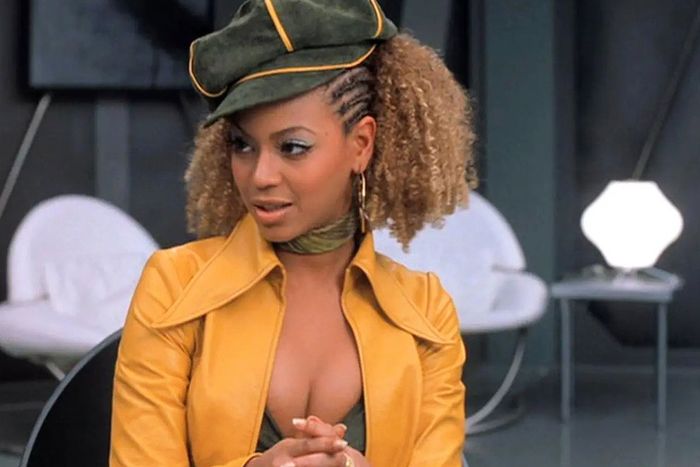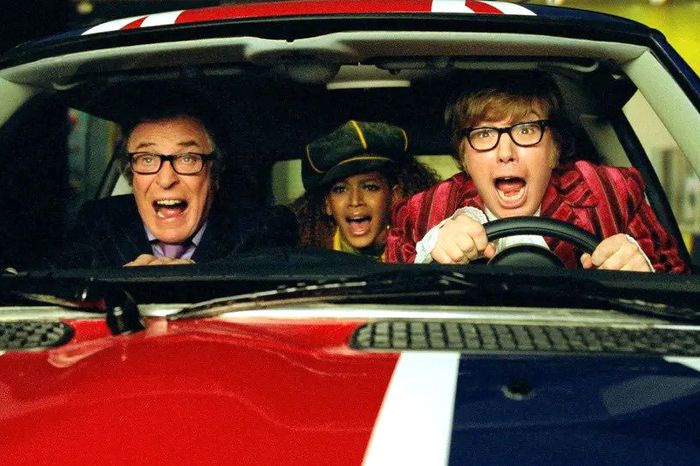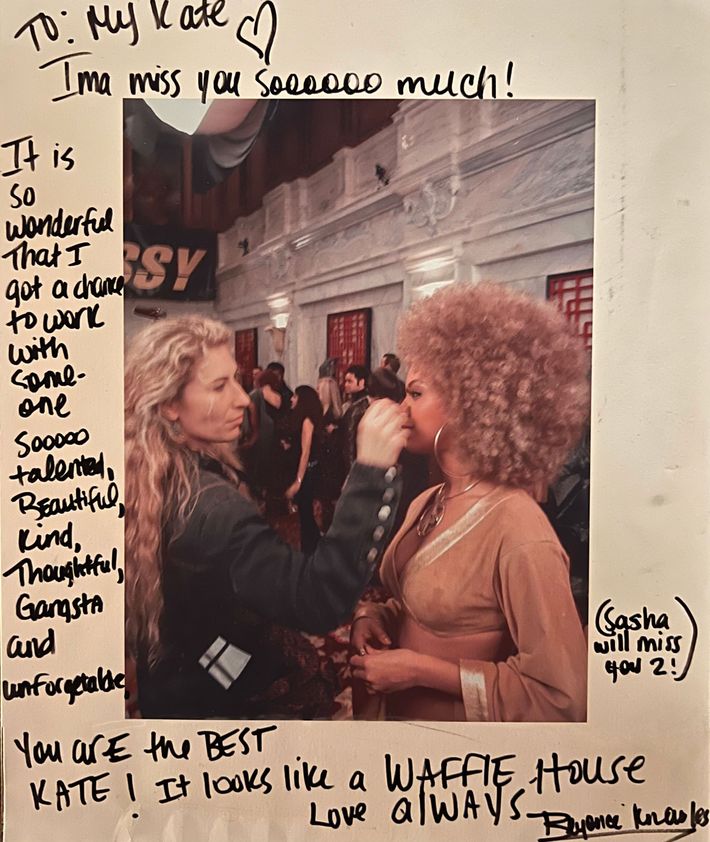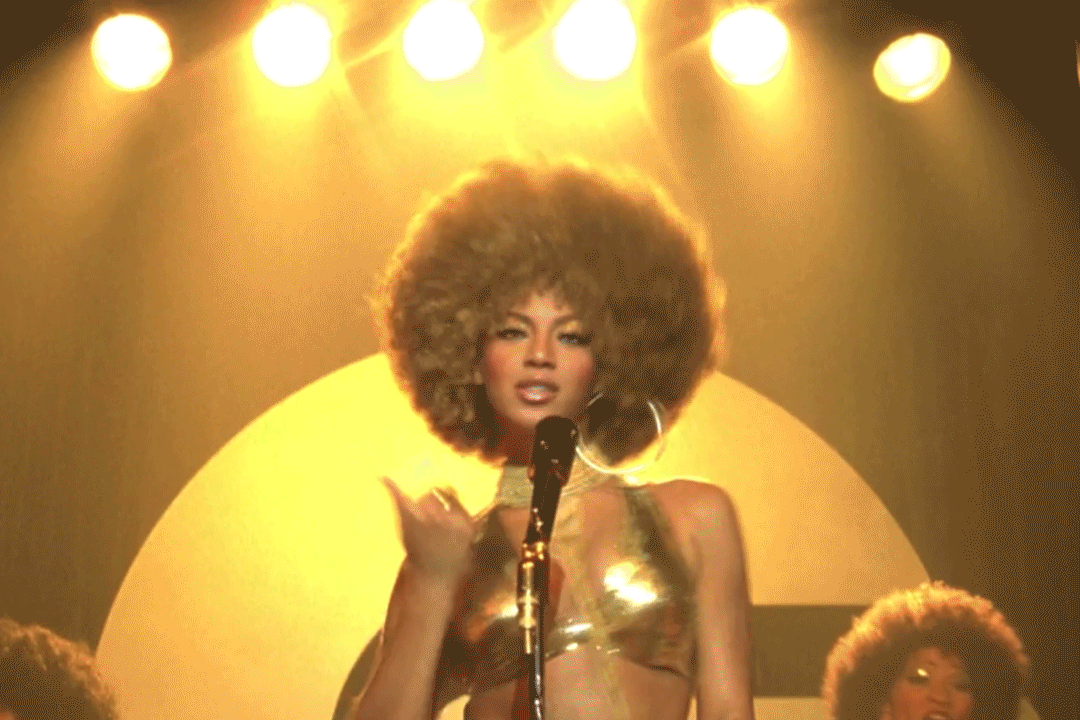
This article was featured in One Great Story, New York’s reading recommendation newsletter. Sign up here to get it nightly.
Beyoncé has given the world innumerable gifts: the lyric “tell MCI to cut the phone poles,” the Bob Fosse–inspired “Single Ladies” dance, the infamous Met Gala elevator drama, decadent pregnancy announcements, this GIF, Coachella. Which Beyoncé souvenir am I most grateful for? I choose what now feels like an anomaly in her rarefied, holier-than-holy pop career: Foxxy Cleopatra, a.k.a. “a whole lotta woman.”
Austin Powers in Goldmember, the third installment in a franchise that launched to modest success and ballooned to an abiding cultural phenomenon, turns 20 this summer. Destiny’s Child would release one final album in 2004, but Goldmember — the seventh-highest-grossing movie of 2002 — marks Beyoncé’s transition from girl-group captain to singular superstar. It’s when Beyoncé Knowles became simply Beyoncé, even if it feels nothing like the Beyoncé we know today. With the movie came her first solo single (the underrated funk jam “Work It Out“) and a bridge to the image-defining smash “Crazy in Love,” generally considered her true breakthrough.
At the time, Beyoncé was anxious to prove herself as an actress. (Crossover fame remained very important in the early 2000s. Just ask Mariah Carey.) Her only credit was Carmen: A Hip Hopera, MTV’s contemporary spin on the classic French opera. That’s where Goldmember producer John Lyons got the idea to enlist her to play Foxxy, a stylish FBI agent who used to shag Austin (Mike Myers) and moonlights as a nightclub singer at Studio 69. As Beyoncé recounted in 2002, she auditioned twice. “I read with Mike and just tried to be the straight guy. When I left, I was convinced I wasn’t going to get it,” she told Newsweek. For her callback, she “went back in wearing a Pam Grier–like catsuit, an Afro wig, and had memorized every blaxploitation film ever made.” Her fate was sealed.
Upon release, critics were undoubtedly drawn to Beyoncé’s supporting character but remained mixed on the film’s treatment of her. “One new character I did like was Foxxy Cleopatra,” Roger Ebert wrote. “Alas, the movie doesn’t do much with her except assign her to look extremely good while standing next to Austin.” “Plunking a Pam Grier–like blaxploitation diva into the mix is a nifty idea, and Ms. Knowles knows how to strut that strut,” Stephen Holden wrote for the New York Times. “But the movie doesn’t quite know what to do with the character, once she has appeared.” Beyoncé went on to headline The Fighting Temptations, The Pink Panther, Dreamgirls, Cadillac Records, and Obsessed before ostensibly abandoning live-action acting — RIP to her version of A Star Is Born — and making her best music to date (4, Beyoncé, Lemonade, The Lion King: The Gift). The fact that she is now the most respected pop star alive makes the story behind Goldmember’s goofiness, and Beyoncé’s decision to take part in it, all the more fascinating.
The Future Better Get Ready
The first Austin Powers movie, International Man of Mystery, grossed a decent $53.9 million in 1997 but swelled in popularity when released on home video later that year. The budget for 1999’s The Spy Who Shagged Me nearly doubled, and Goldmember’s budget doubled again to a reported $63 million. Borrowing its title from the James Bond classic Goldfinger, the cameo-filled story melded ’70s blaxploitation homage and daddy-issues melodrama, with Austin and Foxxy setting out to rescue his often absent father (Michael Caine) while the vile Dutchman known as Goldmember (Myers) prepares to launch a meteor into the earth.
Jay Roach, director: There were a lot of discussions about who the love interest and partner in crime would be in that third installment, and we’d had such incredible experiences with Elizabeth Hurley and Heather Graham.
John Lyons, producer: We knew that we were searching for a young Black actress. I was originally a casting director and always loved looking at musicians for parts, and I remember Sharon Sheinwold Jackson, the agent, telling me that the lead singer for Destiny’s Child was really special.
Roach: She was already a known person at the time, and we just wanted to go crazier with everything we did in that third film. This movie was really hard to put together. Much like every casting decision in Austin, it all seemed impossible. We’re going to get Steven Spielberg to pretend like he’s directing Austin? We’re going to get Tom Cruise to play Austin, and we’re going to get Gwenyth Paltrow to play Dixie Normous?
Lyons: Our casting director, Jeanne McCarthy, was very aware of her and, when Beyoncé came to L.A. on tour, tried to arrange a meeting between her and Jay Roach. But both of their schedules were really tight and just didn’t mesh, and the meeting didn’t happen. Jeanne really stayed on the case, though we did have to start reading a lot of actors. There were some great people, but there was always a bit of a sense that we really needed to get Beyoncé in to read.
Roach: We sat down with Beyoncé and her mom on the rooftop patio outside of Mike Myers’s room at the Chateau Marmont and talked about the possibilities for the character. Her mom was very much into blaxploitation movies. She could tell that was the DNA for Foxxy. Her mom was so cool and so helpful and instantly had ideas for us.
Beyoncé and Mike hit it off like crazy. Instantly I could tell there was chemistry with them. I do remember one other person that we considered for it, but Mike designed the character for Beyoncé.
Lyons: It was clear that she was so nervous at that audition, and Tina came with her, both as moral support and, I’m sure, to size us up and see if we were going to be respectful of her daughter and if we deserved her.
Matthew Rolston, director of the “Work It Out” video: This was an important moment in her career, a real turning point, going from the front woman of a successful pop band to a first solo effort. It had been carefully constructed by her mom and dad to be her debut as an actress and a solo pop act at the same time.
Finding Foxxy’s Look (and Wigs)
“Austin’s world is an explosion of color and pattern,” costume designer Deena Appel says, and the franchise’s Bond-girl analogs were appropriately ostentatious. Elizabeth Hurley wore a glossy leather catsuit, and Heather Graham wore bright pinks and a memorable hand-crocheted minidress. But for Beyoncé, the costume, makeup, and hair department teams found inspiration beyond 007 iconography.
Deena Appel, costume designer: When you start with a name like Foxxy Cleopatra, you can’t help but reference Pam Grier and that era. Goldmember was supposed to be set in ’75, but there were still a lot of ’60s aesthetics.
Beyoncé (BBC, 2002): My mom loved Pam Grier. She loved Foxy Brown. I got a chance to meet her when I was 15 at the Source Awards. Before the movie, I watched every one of her films I could find. At the reading with Mike, I wouldn’t talk unless I was talking like her. She helped me tremendously. She’s who I based everything on.
Kate Biscoe, makeup artist: We looked at the fashion magazines of the time, Ebony and Jet. That’s the mood we wanted to get.
Jeri Baker, hairstylist: We had Vogue covers from that time period in our trailer, with Carol Alt on the cover.
Appel: What was challenging about it was that we were referencing the roller-disco era, and that period didn’t necessarily have a lot of metallics in it. Foxxy needed to be this stage presence that launched that world. I wanted her to be the most gold in the room. Chain mail just seemed like the best call. I also wanted to brand her character, so I enlisted my brother to help me design a fox logo, which became a necklace and an earring. I had it embossed on the side of her platform shoes. And her belt buckle said “Foxxy.”
We wanted to create a signature silhouette, so I created the midriff jacket and low-slung skirt or the yellow suit with an olive sash. The over-the-knee boots were also a way to give her a fierce quality. Everything she wore — accessories, shoes, clothing, everything — was designed, sketched, and built.
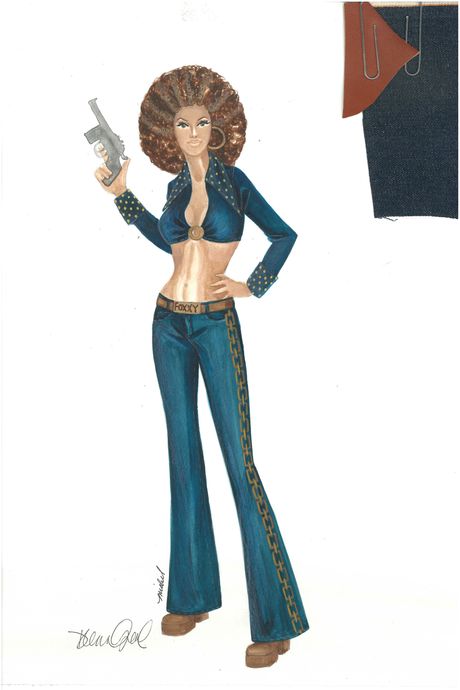
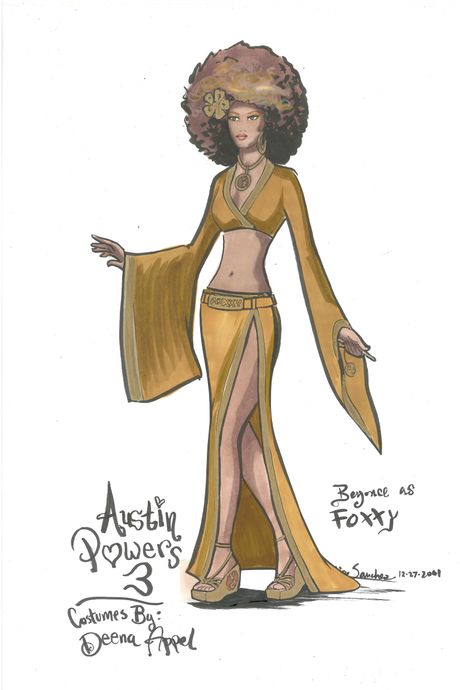
Erwin Kupitz, wigmaker: Mike Myers wanted a combination of Tina Turner’s hair from the ’80s introduced into an Afro.
Candy Walken, hair department head: I called Erwin and said, “Color’s really important. It needs to be kind of a blondish color. I want it to be huge, like bigger-than-life, but I want it to be soft so that when she dances it will undulate and not be stiff.” He said, “How wonderful. I’m gonna get Swedish hair, and I’m going to perm it on toothpicks.”
Kupitz: To make a wig like Beyoncé’s Afro is very, very tedious. Everything is custom-made from scratch. It’s about 150 working hours, starting with a plaster bandage life cast, which will be used to create a custom wig block on which the foundation of the wig is built. The wig will be made on that block so it fits 100 percent.
I was one of the few wig designers who used this technique. I have a copy of the original shape of Beyoncé’s head. Over the 45 years of my professional career, I collected probably a hundred, if not more, of all kinds of wig and beard blocks of famous actors, from Keanu Reeves to Bruce Willis to Angelina Jolie to Jodie Foster.
Walken: It was the first camera test when I put the wig on her, and she was just blown away.
Kupitz: She was thrilled. From then on, I worked on many occasions with Beyoncé — almost all of her movies, like Cadillac Records and The Pink Panther. Over the years, our relationship intensified. She built a trust in me and would call and say, “Erwin, I’m doing a movie and this is how I have to look. I need a wig.” She’d tell me what she wants, or her assistants would send me a picture or sketches.
Appel: Initially, I was really afraid that with Beyoncé would come Tina, because I knew that Tina had a hand in designing a lot of her stage costumes. I had an impression that she would want to be very involved. And much to my surprise, Beyoncé came to her first fitting by herself. Tina was never involved. In fact, I don’t think I ever met her.
Suzanne Todd, producer: I don’t remember a level of entourage like Beyoncé would have now. I’ve worked with some people that have literally 27 people in their entourage.
Appel: I think it was partly Beyoncé separating her stage career from her acting career and giving over to the process. She always came alone to her fittings — no entourage, no Tina.
Kupitz: She was, like young people are, interested in how she has to look and the makeup and the hair, but she let us do our job.
Walken: After I had done all these tests, the producer came to me and said, “I know this isn’t going to make you happy, but we have to hire a personal hairstylist for Beyoncé. It’s too big a film.” I was devastated. I’d worked so hard to have someone else take credit for my work.
Kupitz: After the first couple of days in preproduction, she introduced us to Kim Kimble, who is today a famous hairstylist.
Walken: She had it in her contract that she would have a personal, and she didn’t have one. Kim owned a salon. They bonded, and that’s wonderful. It certainly made Kim’s career.
Biscoe: I remember her and Kim teaching me the original Harlem Shake.
Baker: No matter what, she was always the first one to say hello in the makeup trailer. The art department always made sure, Is she in a place where she wants to talk? Is she in a place where she wants to hear music in the trailer? But she would say to us, “Hey, don’t worry about me. Do your thing.”
Biscoe: I played her Shuggie Otis, who is one of my favorite musicians. On second listen, she was humming along with these incredible harmonies that were not written into the music. I was blown away. She was coming up with this whole other layer to the music and creating these amazing augmented chords. It was like having a personal concert.
You Have the Right to Yell ‘Action!’, Baby
What was it like to work with Beyoncé circa 2002, back when her father still managed her music career and she hadn’t yet curated the untouchable mystique that would define her reputation in the 2010s? At the time, Destiny’s Child was still promoting the album Survivor, and Beyoncé had adopted a 1,200-calorie-per-day diet to play Foxxy. In her own words, “Doing movies are like my college. I get to learn about myself and get my independence by myself. I have almost a normal schedule, and I get to be around the same people for a significant amount of time, so I can meet friends.”
Angela Meryl, Beyoncé’s stunt double: My earliest memory is seeing Beyoncé riding on a golf cart by me with an AD or a PA. I didn’t see her that often because we were mainly on second unit. But as you get closer and you have an intimate conversation with her, it turns out, wow, she really knows what she wants and is really driven to get to where she wants to be.
Jack Gill, stunt coordinator: When she showed up, everybody was in awe. Everybody was going, “Oh my God, this woman is so beautiful.” She comes dressed in this ’70s look, and then when she went to do the first scenes, she was great at it, but you could see that acting was not her first forte. She was a little nervous with it. Mike really tried to help her out with that. He would come in and joke around with her and get her more comfortable. She was having a hard time with a lot of the dialogue — not that she couldn’t remember it, but she kept feeling that her delivery was not up to par.
Beyoncé (BBC, 2002): I was very nervous. I didn’t really know what I was doing. I was just grateful to get the opportunity … I felt like it was a new chapter of my life, a new way to grow as an artist.
Sybil Azur, Foxxy’s backup singer: Beyoncé was at the beginning of her acting career, and we were watching Mike almost guiding her within the scene because this was his wheelhouse. I remember her asking us questions, like “How long have you guys been dancers?” and “Do you do stuff like this a lot?” Britney Spears felt more untouchable.
Roach: Her excitement for what she was doing was so contagious. It really helped Mike to keep going. It’s hard with sequels to make sure everything stays fresh.
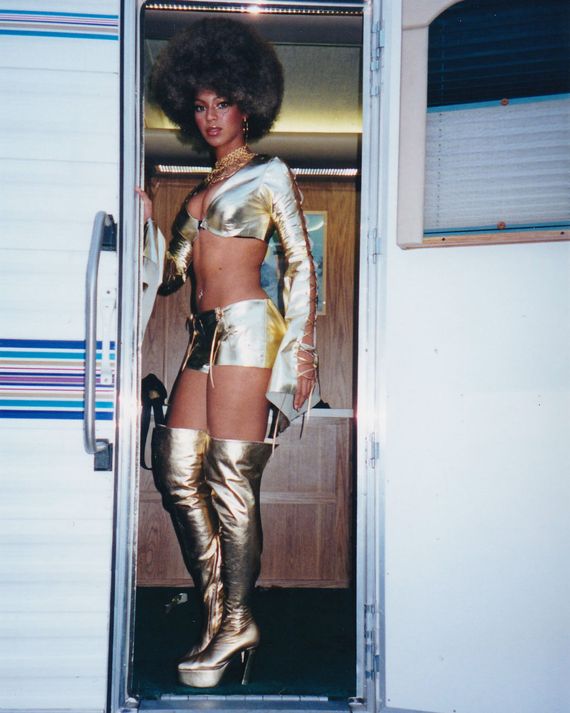
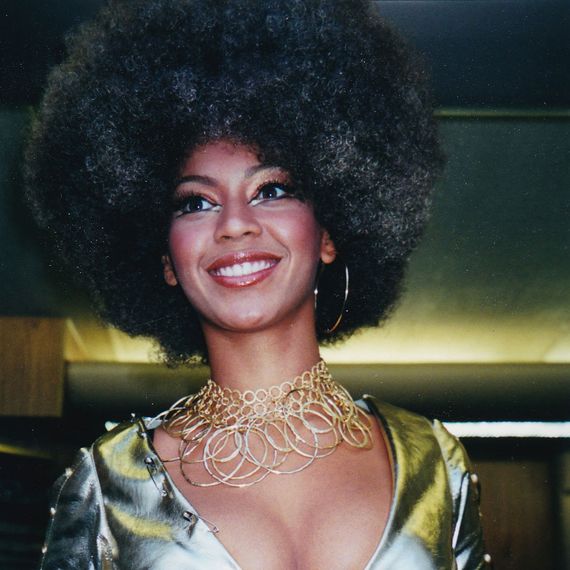
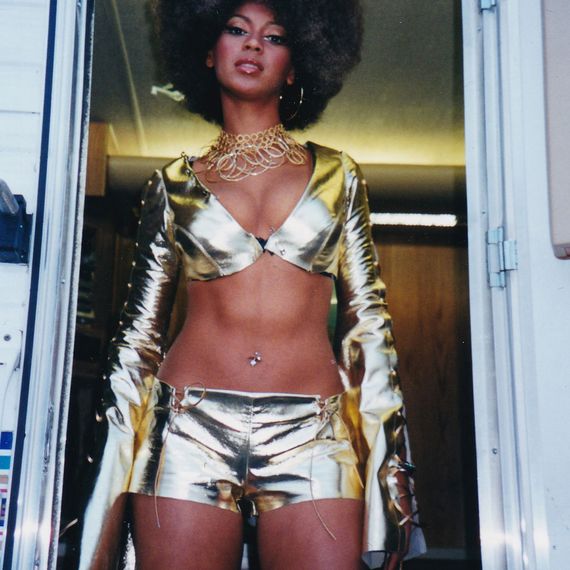
Todd: I remember everybody talking about how she seemed almost shy, much more soft-spoken than they were expecting. I think she was really looking to Jay to be directed. She wanted to be fantastic. It feels like that’s always been her thing.
Robert Wagner, actor (Number 2): You just had the feeling that she was so real and honest. Her mother and father were there watching. She was very responsive and very anxious about doing well.
Gill: We did some of her acting bits first, and then we said we’re going to move to her singing number. So everybody moves the cameras over and we get ready. Here’s our first take and she friggin’ nailed it. It was like, Oh my God, this is her element. This is what she does. She’s not nervous now. She knows exactly what she’s doing. It was totally different.
Walken: We all just stood there and our mouths dropped open. She became this incredible light. She was 19 years old and had such command of that stage when she stepped onto it. None of us really knew why they’d chosen her for this character, and then we understood.
Jayne-Ann Tenggren, script supervisor: We did it over and over and over and over, and every time she nailed it. Particularly someone who’s new to that arena, they get fatigued. After the sixth take, something will go awry. But it never did.
George Flores, boom operator: You get to a certain point where you can hear in performers’ voices the way they use their breath and their phrasing and pausing. It didn’t strike me until much later, but she was a vocalist, so her levels were always good and we never had to ask her to speak up. But you could tell there was a little bit of nervousness there sometimes. Some actors, it takes a little time to get their rhythm.
Biscoe: She could do any accent. She could do British, she could do Scottish, she could do New York. Sasha Fierce, her alter ego who would carry on conversations in a French accent, already existed. People work with dialect coaches to be able to do what she could just naturally do. She has such a good ear, and it’s not just for notes — it’s for inflection, for delivery, for timing, for making vowel sounds.
John Houlihan, music supervisor: For “Hey Goldmember,” we decided to mash up three KC and the Sunshine Band songs. We went to Mike’s hilarious brother, Paul Myers, and he wrote the lyrics. In the recording studio, Beyoncé and Solange rolled in together, very low-key but enthusiastic. As we hoped, Beyoncé took control of her vocal tracking. She was a super-pro and had a great ear for perfecting her lead vocal and the backing tracks. Solange was up next for backups, and Beyoncé guided her to perfection. Mike Myers came to the session after his filming wrapped that day and we all laid down a disco clap track. We were all laughing our heads off.
Derricks: I put her sister, Solange, in it as Foxxy’s backup singer. I remember Beyoncé and I giggling because she was young and everything in Austin Powers is so suggestive. “He’s got the Midas touch, but he touched it too much” — that was a lyric that we were freaking out about for her sister.
Appel: What happened, the way I understood it, was when Tina heard the song and realized what that really meant, she felt it wasn’t appropriate for Solange. I want to say the costume had already been built, so it was a mad scramble to find somebody to replace her.
Marguerite Derricks, choreographer: I always do a pre-prep on every movie because I know that time is limited with actors. I had everything together so she could come in and see what my vision is — hard-hitting disco moves but done in a really smooth way.. Then I could tailor and alter it. But with Beyoncé, you don’t have to tailor or alter anything; she can do everything very, very well.
Rolston: Anything you teach Beyoncé in terms of movement, within two seconds, she can do it. She has such control over every inch of her being.
Gill: The great part about singers and dancers is that I can choreograph a dance sequence just like I choreograph a fight sequence. I just put the fight scene together with beats, then it’s easy for them. I did the same thing with Michael Jackson in Moonwalker. All of the stuff that was physical on the sets, that was all her. Beyoncé did every stunt scene but the car sequence where Austin drives his Mini Cooper into the water.
Lyons: She put herself on a really tough physical regimen and diet. She and Matthew and Tina were keenly aware of the expectations that both the music business and Hollywood frequently have for how young, beautiful women should look and were smart about making those ideas work to their ends.
Diane Mizota, actress (Fook Mi): Being next to Beyoncé in the makeup chair was like, “Oh, yeah, that’s the girl from Destiny’s Child.” She was pretty quiet. She would kind of whisper little asides to me, like, “Oh my God, I’m so hungry.” I just remember she had this big bodyguard who would come in and sneak her donuts on a napkin. I would see her take a bite behind the napkin and kind of smile at me. I remember thinking, Oh my God, she’s so cute. She just wants a donut! It’s a night shoot, and she’s probably working out like crazy.
Biscoe: When we were shooting, someone brought her a poster that would be promoting the movie. He showed it to her, like, “Do you like it?” And she was kind of like, “Yeah.” He goes, ‘What’s the matter?” And she says, “You made me too skinny. It’s not me.” Then she did this hourglass shape. And he said, “Okay, we’ll fix that.” She walked away to go do the scene, and I looked at him and smiled, like, “Is that the first time that you’ve ever had an actress ask to make her body bigger?” He was like, “Yes. It’s going to cost me thousands of dollars, but I am going to do it.”
Working It Out
As was common throughout the 1980s, ’90s, and 2000s, event movies often had soundtracks that might generate a single to broaden the film’s publicity. The Spy Who Shagged Me enlisted Madonna to write and record the neo-psychedelic hit “Beautiful Stranger,” whose Brett Ratner–directed music video featured Myers in character. Casting Beyoncé offered an obvious opportunity to replicate that success. Pharrell Williams and his Neptunes partner Chad Hugo co-wrote “Work It Out” with Beyoncé, but its retro funk didn’t connect with audiences. The song never charted on the Billboard Hot 100. Nevertheless, in retrospect, her former coworkers are nothing but gobsmacked thinking back on her time on set.
Rolston: One of the main things I remember about the video shoot is that she was just so tired. She was exhausted. She had been on tour, I think in Europe, and flew to New York on an all-nighter specifically to do this shoot, which was a several-day shoot, and then she had to go back to rejoin the tour. I think she was going on two hours of sleep during rehearsal. On the first day of rehearsal, she was learning this mic trick, and she chipped the edge of her tooth because the mic hit her mouth. She had to leave to go to a cosmetic dentist to get that fixed.
Houlihan: “Work it Out” was a blast to record in Los Angeles — incredibly small vocal session with only Beyoncé, Pharrell, and me. The franchise was insatiably obsessed about having singles and music videos. Pop culture is always competitive, but Mike Myers knows better than anyone how to break through. At that time, MTV and 106 & Park on BET were key to opening your film and album release.
Rolston: I always love to touch the past and have some authenticity. I’ve known Bob Mackie for years, and I called him up. He said, “Oh, I love Beyoncé.” For the video, what I wanted was a dress that he had created for Tina Turner when she appeared on The Sonny and Cher Show. It was a long fringed gold dress. It was the ultimate Goldmember dress, and it had the ultimate movement. Unfortunately, that dress was no longer in existence, but he did send over a selection of his costumes from that period that were appropriate. We ended up using a dress he made for Ann-Margret around the same time.
Roach: What Beyoncé contributed to Goldmember is so huge. Its lasting presence is very much due to her involvement, and the fact that she’s become this mega-mega-megastar can’t hurt.
Michael York, actor (Basil Exposition): It was in retrospect that I realized I’d been face-to-face with this humongous new star, and I relish being in the afterglow. She was so approachable and normal. I remember being rather full of admiration because she’d been out all night doing some concert and came straight to the set with all the energy in the world.
Lisa Ruffin, Beyoncé’s stand-in: During that time, it was the American Music Awards and she had gone, and then after the awards, she came to the set. There was nothing pretentious about her. Now I see why she is successful. When I met her, she was like, “How do you do your hair?” She’s asking me!
Walken: She just lit up the room. She sparkled. She had her 20th birthday on Austin Powers. You always do a cake and a celebration at lunch. And she was dating Jay-Z at the time, and he came to set a couple of times. I saw them together outside her trailer.
Rolston: I’m always asked, “Who are your favorite people that you’ve ever worked with?” I’ve worked with some great people, but she’s right at the top of the list. She’s humble, hardworking, no ego trips, such an incredible, eager willingness to exceed and excel. This is a person of high intelligence, great manners, and huge talent and beauty. I feel a chill saying that.
Interviews were edited and condensed for clarity.


